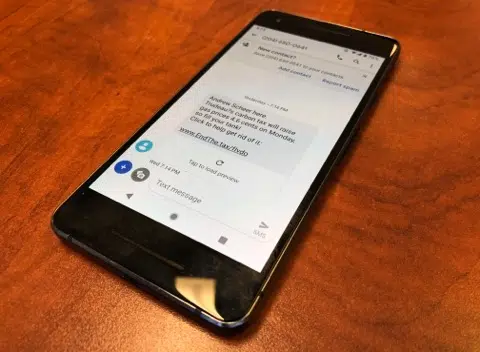If you haven’t already, you may soon receive a text message from Andrew Scheer.
The robo text from the Conservative Party leader warns Canadians in Saskatchewan, Manitoba, Ontario and New Brunswick to fill up on gas before the federal carbon tax kicks in on Monday, raising prices by 4.6 cents per litre.
“It’s truly a full-court press to a level we haven’t really done before. It’ll include radio ads, text messages, targeted social media ads, and door-to-door canvassing,” Conservative Party spokesperson Cory Hann said in an emailed statement.
He also explained how the party gets the phone numbers.
“It’s a combination of numbers that people have voluntarily given us or, like other political parties elsewhere in the country have used, we’re making use of a program that generates mobile numbers,” said Hann.
Robo campaigns like this are ideal when micro-targeting a specific audience to pass on your political message, according to Jim Farney, head of politics and international studies at the University of Regina.
He explained robo texts are becoming the new normal in politics instead of a phone call interrupting your dinner.
“If you’re going to do something that’s pretty widespread, this seems to be probably the least invasive or annoying way,” said Farney.
Farney said robo texting is also cheaper while randomly generating those phone numbers instead of buying email lists because emails can’t be randomly generated.
While some people may still find an unsolicited text message from a political party annoying, Farney doesn’t see the strategy breaking any laws. He said even during an election, the main concerns are laws around campaign finances and where the message is coming from.
“As long as they’re not overspending and it’s clear it’s coming from the Conservatives, off the top of my head I can’t think of problems,” he said.











